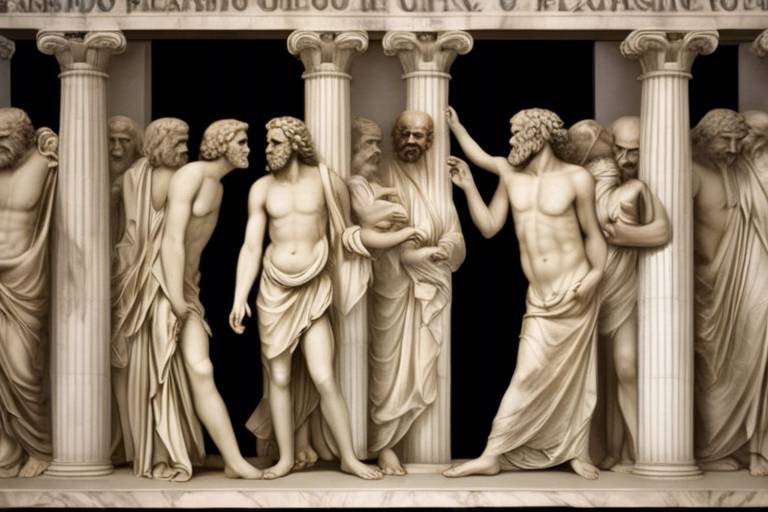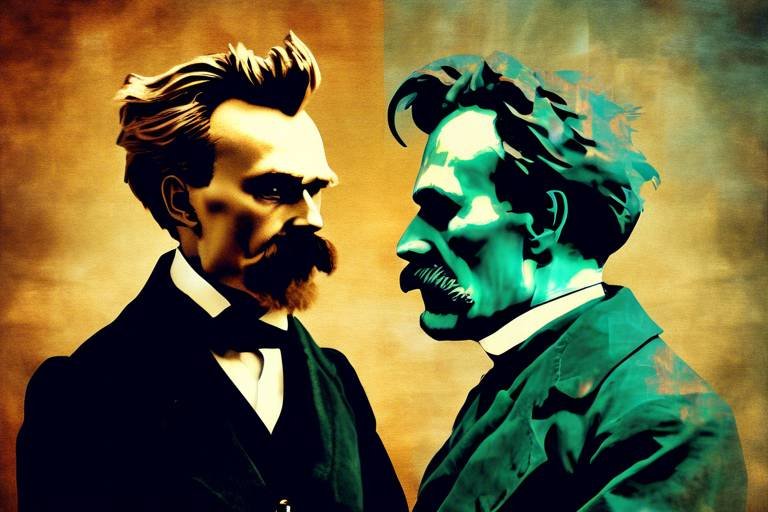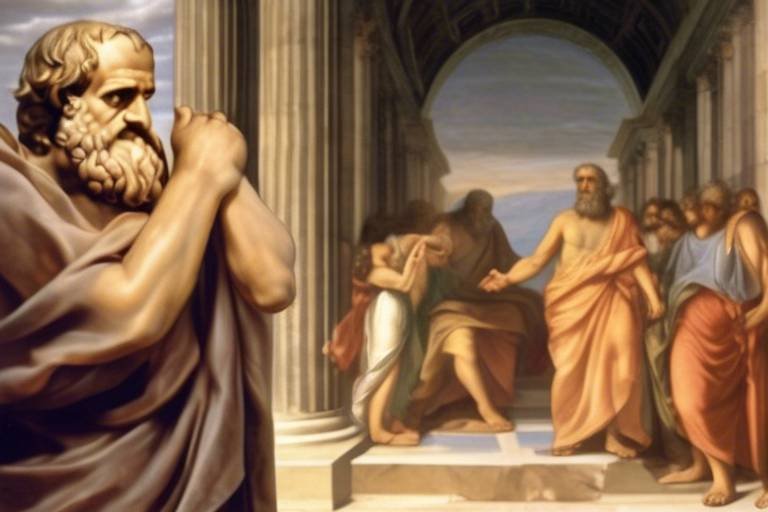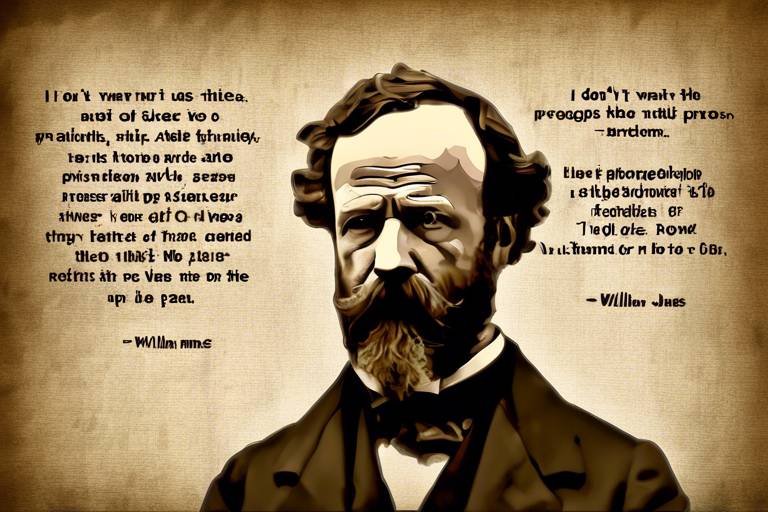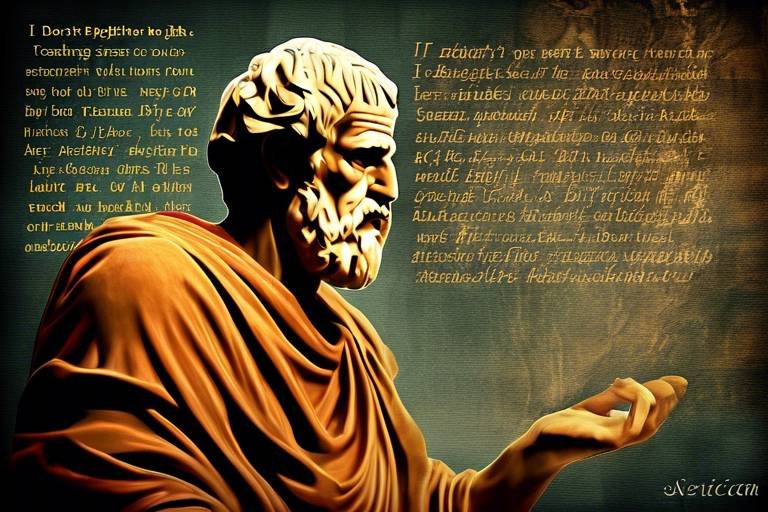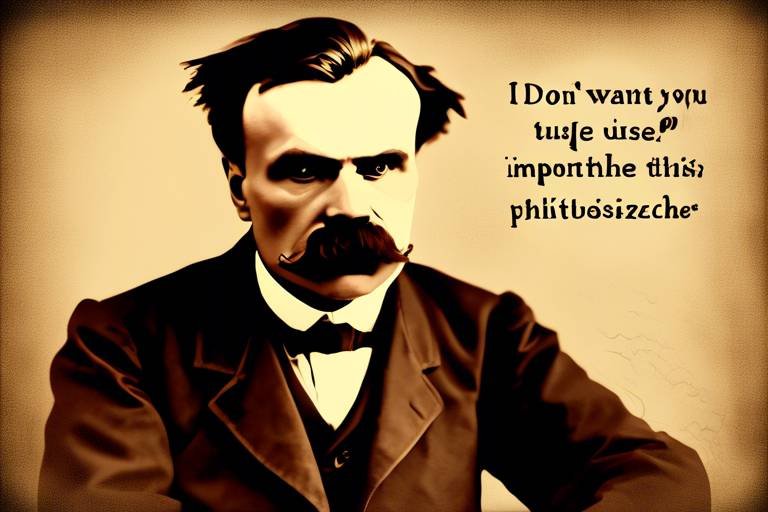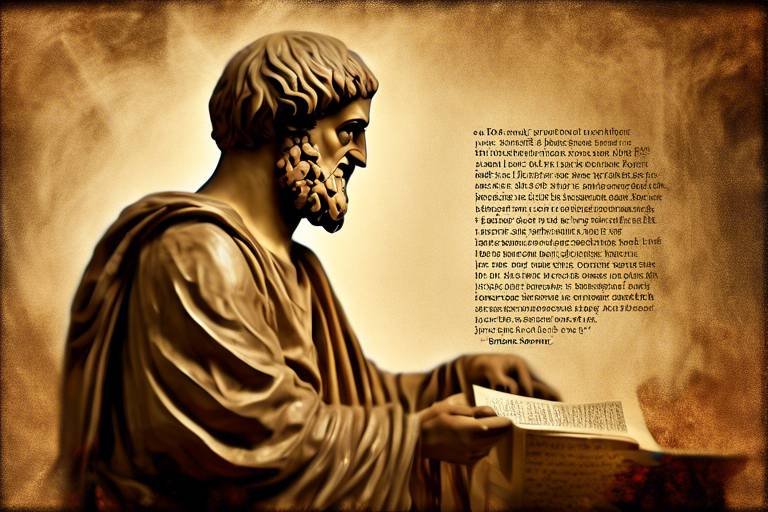Philosophy of Love: Plato's Symposium to Modern Perspectives
The concept of love has been a profound subject of inquiry for philosophers throughout history. From the deep, contemplative dialogues of ancient Greece to the vibrant discussions in modern society, love remains a fundamental aspect of the human experience. In this exploration, we will journey through time, starting with Plato's Symposium, where love was intricately linked to beauty, desire, and the pursuit of truth. This foundational text not only shaped Western thought but also laid the groundwork for how we understand love today.
As we transition into the ideas of Aristotle, we find a nuanced perspective that intertwines love with friendship, emphasizing the importance of relationships in achieving a fulfilling life. Aristotle's categorization of love into various forms, such as familial, platonic, and romantic, invites us to reflect on the different dimensions of love that enrich our lives.
Fast forward to contemporary times, and we see a broader landscape where love is examined through the lenses of psychology, sociology, and feminism. Modern thinkers challenge traditional notions, advocating for equality and mutual respect in relationships. This evolution of thought demonstrates how love is not just a feeling but a complex interplay of emotions, social constructs, and ethical considerations.
In this article, we will delve into these rich philosophical traditions, exploring how love shapes our understanding of ourselves and our relationships with others. Whether it's the passionate yearning of Eros or the deep bonds of Philia, love continues to be a powerful force that influences our actions, thoughts, and morals. Join us as we unravel the intricate tapestry of love, from ancient philosophies to modern interpretations, and discover how these ideas resonate with our everyday lives.
- What is the main idea of Plato's Symposium?
Plato's Symposium explores the nature of love, presenting it as a multifaceted concept that encompasses beauty, desire, and the pursuit of truth. - How does Aristotle differentiate between types of love?
Aristotle categorizes love into various forms, including familial, platonic, and romantic, each serving a unique role in human relationships. - What are modern perspectives on love?
Modern philosophy examines love through psychological, sociological, and feminist lenses, offering diverse interpretations that challenge traditional views.

Plato's Concept of Love
Plato's Symposium is a treasure trove of philosophical thought, where love is not merely a fleeting emotion but a complex tapestry woven with threads of beauty, desire, and the eternal quest for truth. In this dialogue, various characters engage in a series of speeches, each offering their unique perspectives on love, or eros. This multifaceted concept is depicted as both a driving force and a guiding principle in human life, urging individuals to seek higher forms of existence.
At the heart of Plato's philosophy is the idea that love transcends the physical realm. While many may associate love with mere attraction, Plato invites us to look deeper. He suggests that love begins with the appreciation of physical beauty, but it does not end there. Instead, it serves as a catalyst for a more profound understanding of the ideal forms—the ultimate truths that govern our universe. In this sense, love becomes a ladder, allowing us to ascend from the tangible to the intangible, from the imperfect to the perfect.
One of the most compelling aspects of Plato's portrayal of love is the notion that it is inherently linked to the pursuit of wisdom. Love, in this philosophical framework, is not just about personal satisfaction or romantic fulfillment; it is about the yearning for knowledge and understanding. Plato argues that true lovers are those who desire to know and understand each other on a deeper level, fostering an environment where both individuals can grow intellectually and spiritually.
Furthermore, the dialogues in the Symposium explore the concept of Platonic love, which emphasizes a deep emotional connection devoid of sexual desire. This notion has profoundly influenced Western thought, promoting the idea that love can exist in various forms, each with its own significance. In fact, Plato's vision encourages us to cultivate a love that is rooted in mutual respect and admiration, rather than mere physical attraction.
In summary, Plato's concept of love is a rich and layered philosophy that challenges us to reconsider our understanding of this powerful emotion. It invites us to recognize love as a journey toward enlightenment, urging us to seek beauty not just in others but also within ourselves and the world around us. By doing so, we can transform our relationships and elevate our human experience.

Aristotle's View on Friendship and Love
Aristotle, one of the towering figures in Western philosophy, offers a profound exploration of love that intertwines deeply with the concept of friendship. In his work, he argues that love is not just a fleeting emotion but a fundamental aspect of human relationships that shapes our character and moral compass. Aristotle's understanding of love is multifaceted, encompassing various forms that extend beyond mere romantic attraction. He emphasizes that true love is rooted in mutual respect, shared values, and a commitment to the well-being of the other.
In Aristotle's view, friendship is the highest form of love, and it is essential for a fulfilling life. He categorizes love into three primary types: philia (friendship), eros (romantic love), and agape (unconditional love). Each type plays a unique role in our lives, contributing to our happiness and moral development. Aristotle argues that while eros can ignite passion and desire, it is philia that sustains long-lasting relationships and fosters virtue.
Aristotle posits that friendships can be classified into three distinct categories, each reflecting a different basis for connection:
- Friendships of Utility: These are relationships formed out of mutual benefit. For instance, colleagues who work together may develop a friendship based on shared goals.
- Friendships of Pleasure: These friendships are built on the enjoyment and pleasure derived from each other's company, often seen in social settings where individuals bond over shared interests.
- Friendships of the Good: This is the highest form of friendship, where individuals admire each other's virtues and strive for mutual growth. It is characterized by a deep sense of respect and a commitment to the well-being of one another.
Aristotle argues that the friendships of the good are the most fulfilling, as they are based on a genuine appreciation of each other's character. These relationships are not only pleasurable but also serve as a foundation for moral development. In essence, they encourage individuals to cultivate virtues such as honesty, loyalty, and integrity.
Moreover, Aristotle emphasizes the ethical implications of love and friendship. He believes that love is not merely about personal satisfaction; rather, it is a catalyst for moral growth. Love inspires individuals to become better versions of themselves, fostering a sense of community and belonging. In this light, love transcends selfish desires and becomes a force for good, promoting harmony and understanding within society.
In conclusion, Aristotle's view on friendship and love is a rich tapestry that highlights the importance of relationships in our lives. By understanding the different types of love and their implications, we can navigate our connections more thoughtfully. Love, in its various forms, is not just an emotion; it is a guiding principle that shapes our actions, influences our character, and ultimately defines our existence.

Types of Love in Aristotle's Philosophy
Aristotle's exploration of love is as intricate as a well-crafted tapestry, weaving together various strands of human experience. He categorizes love into distinct types, each with its own significance and role in the fabric of our lives. Understanding these types not only enriches our comprehension of love but also highlights how they contribute to a fulfilling existence. Let's dive into the three primary forms of love that Aristotle discusses: philia, eros, and agape.
Philia, or the love of friendship, is perhaps one of the most profound types of love according to Aristotle. This form of love is characterized by mutual respect, shared values, and a genuine connection between individuals. Unlike romantic love, which can often be fleeting, philia is enduring and rooted in a deep sense of loyalty and companionship. Aristotle believed that friendships based on virtue are the highest form of philia, as they promote moral growth and encourage individuals to strive for excellence. In essence, these friendships act as mirrors, reflecting our best selves back to us.
On the other hand, we have eros, which represents passionate love. Eros is often associated with desire and attraction, igniting a flame of longing and affection that can be both exhilarating and overwhelming. While eros can lead to profound connections, Aristotle cautioned against allowing this type of love to dominate our lives. He believed that unchecked passion could lead to irrational behavior and ethical dilemmas. Thus, eros serves as a reminder that while desire is a natural part of human experience, it must be tempered with reason and virtue to cultivate a balanced life.
Lastly, Aristotle introduces the concept of agape, which is often described as selfless love. This form of love transcends personal gain and is characterized by compassion and empathy towards others. Agape encourages individuals to act for the well-being of others, fostering a sense of community and interconnectedness. Aristotle posited that agape is essential for a harmonious society, as it promotes understanding and acceptance among individuals. When we embrace agape, we cultivate a world where love is not merely a transaction but a profound commitment to the welfare of others.
In summary, Aristotle's typology of love reveals the complexity and richness of human relationships. Each type—philia, eros, and agape—plays a vital role in shaping our interactions and personal growth. By recognizing and nurturing these forms of love, we can lead more fulfilling lives and contribute positively to our communities.
- What are the main types of love according to Aristotle? Aristotle identifies three main types of love: philia (friendship), eros (passionate love), and agape (selfless love).
- How does philia differ from eros? Philia is based on mutual respect and companionship, while eros is characterized by intense desire and attraction.
- Why is agape important in society? Agape fosters compassion and empathy, promoting a sense of community and interconnectedness among individuals.

Philia: The Love of Friendship
Philia, often translated as the love of friendship, holds a special place in Aristotle's ethical framework. Unlike romantic love, which can often be tumultuous and driven by desire, philia embodies a stable, enduring bond that is rooted in mutual respect, shared values, and common interests. Imagine a sturdy oak tree; it stands tall and provides shelter, much like a true friendship that supports us through life's storms. Aristotle believed that friendships based on philia are essential for a fulfilling life, as they foster virtue and encourage personal growth.
In Aristotle's view, friendships can be categorized into three primary types, each reflecting different motivations and qualities:
- Friendships of Utility: These are based on mutual benefit. Think of colleagues who collaborate on projects; their bond is primarily functional.
- Friendships of Pleasure: These relationships are formed around shared enjoyment, such as friends who bond over hobbies or interests.
- Friendships of the Good: This is the highest form of friendship, where individuals genuinely admire each other's character and strive for mutual growth.
Among these, friendships of the good, or philia, are the most profound and fulfilling. They are characterized by a deep appreciation for one another's virtues and a commitment to helping each other become better individuals. In this dynamic, friends challenge one another to grow, offering constructive criticism and encouragement. This is where the beauty of philia lies; it is not merely about enjoying each other's company, but about lifting each other up, much like how a climbing vine supports its fellow plants to reach for the sun.
Moreover, philia is not limited to a select few. Aristotle argued that the capacity for friendship is inherent in all humans, and it can flourish in various contexts—be it familial ties, platonic relationships, or even among acquaintances. The essence of philia is found in the way it cultivates a sense of community and belonging. When friends come together, they create a microcosm of support and understanding that reflects the larger society. This interconnectedness is vital, as it strengthens social bonds and promotes a sense of collective well-being.
In today's fast-paced world, where digital interactions often replace face-to-face connections, the importance of philia cannot be overstated. In fact, studies have shown that strong friendships can lead to better mental health, increased happiness, and even longer life expectancy. So, how can we nurture this invaluable form of love in our lives? Here are a few suggestions:
- Prioritize quality time with friends—be it through regular meet-ups, phone calls, or even virtual hangouts.
- Engage in meaningful conversations that go beyond small talk, fostering a deeper connection.
- Support your friends in their endeavors and celebrate their successes, no matter how small.
In conclusion, philia is not just a philosophical concept but a vital part of our human experience. It enriches our lives, shapes our characters, and ultimately leads us towards a more virtuous existence. Just as a gardener tends to their plants, we must nurture our friendships, allowing them to grow and flourish, creating a beautiful tapestry of human connection.
What is philia?
Philia is the love of friendship in Aristotle's philosophy, characterized by mutual respect, shared values, and a commitment to personal growth.
How does philia differ from other types of love?
Unlike romantic love, which is often driven by desire, philia is stable and rooted in a deep appreciation for one another's virtues.
Why is philia important?
Philia fosters virtue, personal growth, and a sense of community, contributing to overall well-being and happiness.
Can philia exist in different contexts?
Yes, philia can manifest in various relationships, including familial ties, platonic friendships, and even among acquaintances.

Eros: The Passionate Love
Eros, often referred to as the passionate love, embodies a profound intensity that can ignite the very core of our being. This form of love is not merely a fleeting attraction; it is a deep-seated desire that can lead to both ecstasy and turmoil. Imagine standing at the edge of a cliff, feeling the rush of wind against your face, heart racing with the thrill of the unknown. That’s the essence of Eros—an exhilarating plunge into the depths of emotional and physical connection.
In Aristotle's view, Eros transcends mere physical attraction; it encompasses a yearning for union with another person, an aspiration that can elevate the soul. This passionate love often drives individuals to seek out beauty, not just in others but within themselves. It compels us to confront our vulnerabilities and desires, pushing us to explore the boundaries of intimacy. Eros can be seen as a double-edged sword; while it can lead to profound joy and fulfillment, it can also bring heartache and longing.
The implications of Eros extend beyond personal fulfillment. It raises ethical considerations about how we engage with our desires, how we express love, and how we treat those we love. For instance, the intensity of Eros can sometimes lead to possessiveness or jealousy, prompting us to question whether our love is truly selfless or if it is intertwined with selfish desires. Thus, Eros serves as a mirror reflecting not just our feelings for others but also our inner selves.
To understand Eros more deeply, consider its relationship with other forms of love. While Eros is passionate and often tumultuous, it can coexist with philia, the love of friendship, creating a rich tapestry of human experience. This interplay can lead to a more comprehensive understanding of love as a whole. The following table illustrates the key differences and connections between Eros and other types of love:
| Type of Love | Description | Characteristics |
|---|---|---|
| Eros | Passionate love characterized by desire and attraction. | Intense, often overwhelming, can lead to both joy and pain. |
| Philia | Friendship love based on mutual respect and affection. | Stable, supportive, fosters community and virtue. |
| Agape | Selfless, unconditional love. | Compassionate, altruistic, seeks the well-being of others. |
In conclusion, Eros is a vital component of the human experience, embodying the passionate pursuit of connection and understanding. It challenges us to embrace our desires while navigating the complexities of love. As we explore Eros, we are reminded that love, in all its forms, is a journey filled with both wonder and uncertainty, inviting us to delve deeper into our hearts and the hearts of those around us.
- What is Eros in the context of love? Eros refers to passionate love characterized by intense desire and attraction.
- How does Eros differ from other types of love? Unlike philia (friendship) or agape (unconditional love), Eros is often more intense and can lead to both ecstasy and turmoil.
- Can Eros coexist with other forms of love? Yes, Eros can coexist with philia and agape, enriching the experience of love and connection.

Ethical Implications of Love
When we dive into the , it becomes clear that love is not just a feeling; it’s a powerful force that shapes our moral landscape. Aristotle believed that love plays a crucial role in moral development, suggesting that our capacity to love deeply influences our virtues and personal growth. This connection between love and ethics raises a compelling question: can we truly understand what it means to be good without love?
In Aristotle's view, love is more than mere affection; it is a catalyst for cultivating virtues such as compassion, generosity, and justice. When we love someone, we are often motivated to act in their best interest, which can lead to ethical behavior. For instance, think of a parent who sacrifices their own comfort for the well-being of their child. This kind of love fosters a sense of responsibility and encourages individuals to make decisions that benefit not only themselves but also others.
Moreover, love can challenge us to confront our moral beliefs and biases. When we form connections with people from different backgrounds, we are often compelled to broaden our perspectives. This is significant in today's diverse society, where understanding and empathy are vital. Love, in this sense, acts as a bridge that connects us to others, allowing us to appreciate their experiences and values.
Here are some ethical implications of love that are worth considering:
- Love as a Moral Compass: Love can guide our actions and decisions, helping us to navigate complex ethical dilemmas.
- Love and Responsibility: Loving relationships often come with responsibilities that can shape our character and ethical frameworks.
- Empathy and Understanding: Love fosters empathy, encouraging us to understand and respect the feelings and experiences of others.
In essence, love is intertwined with our moral fabric. It not only influences our personal growth but also shapes our interactions with society. The ethical implications of love remind us that our relationships are not isolated; they ripple outwards, affecting our communities and the world at large. Thus, understanding love's role in ethics is crucial for personal development and social harmony.
Q: How does love influence ethical behavior?
A: Love can motivate individuals to act in the best interest of others, fostering virtues like compassion and responsibility, which are essential for ethical behavior.
Q: Can love exist without ethical considerations?
A: While love can manifest in various forms, its most profound expressions often involve ethical considerations, as genuine love encourages empathy and moral responsibility.
Q: What role does empathy play in love and ethics?
A: Empathy is a key component of love that helps us understand and respect others, making it easier to navigate ethical dilemmas and foster positive relationships.

Modern Perspectives on Love
The concept of love has evolved dramatically from the ancient philosophical texts of Plato and Aristotle to the diverse interpretations we see today. In our contemporary society, love is no longer viewed through a singular lens; instead, it has become a rich tapestry woven from various threads of thought, influenced by disciplines such as psychology, sociology, and feminism. Today, love encompasses a multitude of experiences, each reflecting the complexities of human relationships and the ever-changing social landscape.
Modern thinkers have delved deep into the nature of love, challenging traditional notions and introducing fresh perspectives that resonate with the realities of contemporary life. For instance, psychological approaches to love have gained prominence, particularly with the rise of attachment theory. This theory posits that our early relationships with caregivers shape our ability to form romantic connections later in life. Understanding this can be a game-changer for individuals seeking to navigate their relationships more effectively. It emphasizes the importance of emotional intelligence, which is the ability to recognize, understand, and manage our own emotions as well as those of others.
Moreover, love is often viewed through the lens of personal fulfillment and self-discovery. In a world that increasingly values individualism, love is seen as a journey toward understanding oneself and finding a partner who complements that journey. This perspective encourages people to engage in self-reflection and prioritize their emotional well-being, leading to healthier relationships. Love is no longer just about the union of two souls; it's about the growth that occurs within each person, both individually and together.
Another significant shift in modern perspectives on love comes from feminist philosophy, which critiques traditional power dynamics and the often romanticized notions of love that can perpetuate inequality. Feminist thinkers advocate for love rooted in equality, mutual respect, and shared power. They argue that love should not be a means of possession or control but rather a partnership that fosters independence and empowerment. This redefinition of love challenges societal norms and encourages a more inclusive understanding of relationships, where all voices are heard and valued.
To illustrate the various modern perspectives on love, let's take a look at some key themes:
- Attachment Theory: Explores how early relationships influence adult romantic connections.
- Emotional Intelligence: Highlights the importance of understanding emotions in fostering healthy relationships.
- Feminist Perspectives: Advocates for love based on equality and mutual respect.
- Individual Fulfillment: Emphasizes self-discovery and personal growth within relationships.
As we navigate through these modern interpretations, it becomes clear that love is not a static concept but a dynamic force that shapes our lives in myriad ways. It influences our choices, our relationships, and ultimately, our understanding of what it means to be human. The dialogue surrounding love continues to evolve, reflecting the complexities of our experiences and the diverse society we inhabit.
Q1: How has the definition of love changed over time?
A1: Love has transitioned from being viewed primarily as a romantic or passionate feeling to a more nuanced understanding that incorporates emotional intelligence, personal growth, and equality in relationships.
Q2: What role does emotional intelligence play in love?
A2: Emotional intelligence is crucial in love as it enables individuals to understand and manage their own emotions, as well as empathize with their partner's feelings, leading to healthier and more fulfilling relationships.
Q3: How do feminist perspectives reshape our understanding of love?
A3: Feminist perspectives advocate for love based on equality and mutual respect, challenging traditional power dynamics and promoting partnerships that empower both individuals within the relationship.

Psychological Approaches to Love
When we dive into the realm of , we uncover a rich tapestry of theories and insights that help us understand this complex emotion. Love is not merely an abstract feeling; it’s a multifaceted experience shaped by our psychology, upbringing, and social contexts. One of the most influential frameworks in this area is attachment theory, which posits that our early relationships with caregivers significantly influence how we form romantic bonds later in life. For instance, individuals with secure attachments often find it easier to build healthy and trusting relationships, while those with anxious or avoidant attachment styles may struggle with intimacy.
Additionally, the concept of emotional intelligence plays a crucial role in how we navigate love and relationships. Emotional intelligence refers to our ability to recognize, understand, and manage our own emotions, as well as those of others. It’s like having a roadmap for emotional landscapes, enabling us to communicate effectively, empathize with our partners, and resolve conflicts in a constructive manner. Those with high emotional intelligence are often more adept at handling the ups and downs of love, fostering deeper connections and greater satisfaction in their relationships.
Moreover, modern psychology also emphasizes the importance of self-love as a foundation for loving others. It’s often said that you can’t truly love someone else until you love yourself. This idea highlights the necessity of self-acceptance and self-care, which can lead to healthier relationships. When we embrace our worth and treat ourselves with kindness, we set a standard for how we expect to be treated by others. This not only enhances our relationships but also encourages a culture of mutual respect and admiration.
Furthermore, let’s not overlook the impact of cultural and societal factors on our perceptions of love. Different cultures have unique rituals, beliefs, and expectations surrounding love and relationships. For example, in some cultures, arranged marriages are common, which may shape individuals' understanding of love as a partnership built on duty rather than romantic passion. This diversity in perspectives enriches our understanding of love, reminding us that it is not a one-size-fits-all experience but rather a dynamic interplay of countless influences.
In summary, psychological approaches to love reveal that this powerful emotion is deeply intertwined with our mental frameworks, emotional skills, and cultural contexts. By understanding these elements, we can cultivate more meaningful and fulfilling relationships. As we continue to explore the depths of love, it’s essential to remain open to the various ways it can manifest in our lives, ultimately enriching our human experience.
- What is attachment theory? Attachment theory explains how our early relationships with caregivers shape our emotional bonds in adulthood.
- How does emotional intelligence affect relationships? High emotional intelligence allows individuals to communicate better, empathize, and resolve conflicts, leading to healthier relationships.
- Why is self-love important? Self-love is crucial because it establishes a foundation for how we expect to be treated in relationships, fostering mutual respect and care.
- How do cultural factors influence love? Cultural beliefs and practices shape our understanding and expressions of love, leading to diverse experiences across different societies.

Feminist Perspectives on Love
Feminist philosophy has profoundly reshaped our understanding of love, challenging traditional views that often prioritize romantic love while neglecting the complexities of gender dynamics. Feminist thinkers argue that love should not be confined to the romantic ideal but should encompass a broader spectrum of relationships, including friendships, familial ties, and communal bonds. This redefinition seeks to highlight the importance of equality, respect, and mutual empowerment in all forms of love.
One of the pivotal contributions of feminist philosophy is the critique of the patriarchal narratives surrounding love. Historically, love has been portrayed as a dependency, particularly for women, who were often seen as passive recipients of love rather than active participants. Feminists like bell hooks have argued that love should be viewed as a transformative force that fosters growth and liberation rather than confinement. According to hooks, love is not just a feeling but a choice that requires effort, commitment, and a willingness to engage with vulnerability.
Moreover, feminist perspectives emphasize the significance of emotional labor in relationships. Women have traditionally been expected to perform the emotional work in relationships, often leading to an imbalance in the dynamics of love. This perspective encourages a reevaluation of how love is expressed and reciprocated, advocating for a more equitable distribution of emotional responsibilities. By recognizing the value of this labor, feminist thinkers push for a more holistic approach to love that honors the contributions of all parties involved.
Feminist theorists also explore the intersectionality of love, examining how factors such as race, class, and sexual orientation shape individuals' experiences and expressions of love. For instance, the love experienced by women of color often intersects with cultural expectations and systemic inequalities, leading to unique challenges and forms of resistance. This intersectional approach not only enriches our understanding of love but also promotes inclusivity, ensuring that diverse voices are heard and valued in the conversation about love.
In summary, feminist perspectives on love advocate for a more expansive and equitable understanding of relationships. By challenging traditional narratives and emphasizing the importance of mutual respect, emotional labor, and intersectionality, feminist philosophy invites us to rethink how we engage with love in our lives. Love, in this light, becomes a powerful tool for social change, encouraging individuals to cultivate relationships that are not only fulfilling but also transformative.
- What is the main argument of feminist perspectives on love? Feminist perspectives argue for a broader understanding of love that emphasizes equality, respect, and mutual empowerment, challenging traditional romantic ideals.
- How do feminist thinkers view emotional labor in relationships? Feminist thinkers highlight the often-overlooked emotional labor that women perform in relationships and advocate for a more equitable distribution of these responsibilities.
- What role does intersectionality play in feminist interpretations of love? Intersectionality is crucial in understanding how various factors like race, class, and sexual orientation influence individuals' experiences of love, promoting inclusivity in discussions about relationships.
Frequently Asked Questions
- What is the main idea of Plato's Symposium regarding love?
Plato's Symposium presents love as a complex and multifaceted concept, intertwining beauty, desire, and the quest for truth. The dialogues in this work explore how love influences human relationships and our understanding of the world.
- How does Aristotle differentiate between types of love?
Aristotle categorizes love into several forms, including familial, platonic, and romantic love. He highlights the importance of these different types in fostering meaningful relationships and achieving a fulfilling life.
- What is Philia and why is it important in Aristotle's ethics?
Philia, or the love of friendship, is central to Aristotle's ethical framework. It promotes virtues and strengthens community bonds, emphasizing that true friendship is essential for moral development and personal growth.
- What role does Eros play in Aristotle's philosophy?
Eros represents passionate love, often tied to desire. Aristotle discusses its significance in personal fulfillment and the ethical implications it carries, suggesting that while passionate love can be enriching, it also requires careful contemplation.
- How do modern psychological theories explain love?
Modern psychology approaches love through various lenses, such as attachment theory and emotional intelligence. These theories help us understand how love influences our relationships and emotional well-being, providing insights into the dynamics of human connection.
- What are feminist perspectives on love?
Feminist philosophy critiques traditional notions of love, advocating for equality and mutual respect. Feminist thinkers redefine love's role in society, emphasizing the importance of partnership and shared values in relationships.

